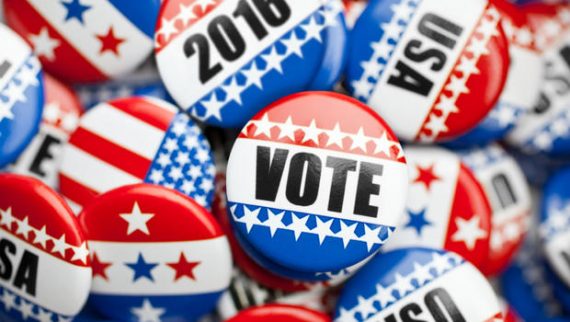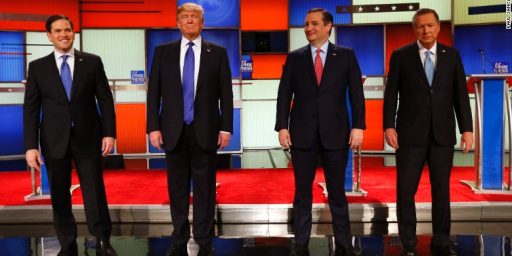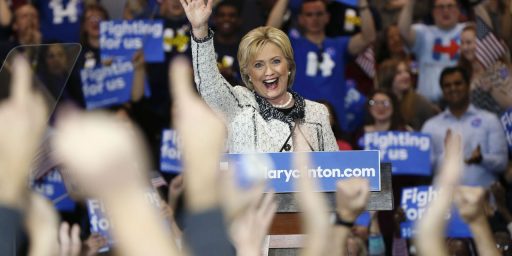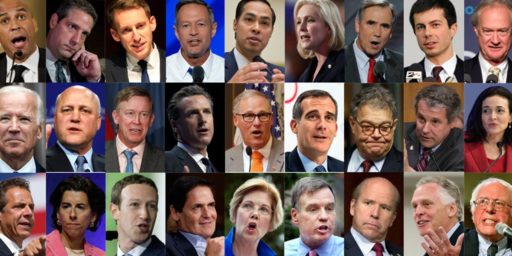Voters Head To Polls And Caucuses In Five States On ‘Super Saturday’
They haven't gotten much attention, but there are five contests today as the 2016 nomination process continues to move forward.
While they aren’t receiving as much attention as the contests coming up next Tuesday in Michigan, or on March 15th in Florida, Ohio, and a number of other important states, both parties are holding contests this weekend that will take us further down the road toward deciding who the respective Democratic and Republican nominees will be. On the Republican side, we have caucuses in three states and a primary in Louisiana while Democrats have a primary in Louisiana and caucuses in two other states:
Texas Sen. Ted Cruz’s strength with conservative voters will match up against Donald Trump’s edge among working-class whites and Bible Belt Evangelicals as four states hold their Republican contests on Saturday.
The two could get more distance on Florida Sen. Marco Rubio and Ohio Gov. John Kasich. Republicans have four contests on tap: Caucuses in Kansas, Kentucky and Maine, and a primary in Louisiana.
Democrats, meanwhile, also caucus in Nebraska and hold a primary in Louisiana — plus another caucus in Kansas. The results could shape the debate Hillary Clinton and Vermont Sen. Bernie Sanders are set to have Sunday night on CNN.
(…)
Saturday’s contests offer Cruz one major tactical advantage.
A crucial component of Trump’s strength has been his ability to expand the Republican electorate — shattering turnout records in states like Virginia and bringing into the fold “Reagan Democrats” in northern states.
But those contests were open. To participate, registered voters don’t have to be registered members of the GOP — they could just walk in on election day.
Republicans have held four contests that were closed: Iowa, Nevada, Oklahoma and Alaska. And Cruz, not Trump, won three of the four.
The most important factor to keep in mind Saturday: Kansas, Kentucky, Louisiana and Maine’s contests are all closed.
That makes Saturday an immediate test of Cruz’s long-term viability. If he can win as many states as Trump, it’ll bolster his argument that he is the logical alternative to the front-runner — particularly if those two are the day’s only winners.
She’s already won South Carolina, Texas, Virginia, Georgia, Tennessee, Alabama and Arkansas.
Now, Clinton is looking at Louisiana — followed by Mississippi on Tuesday — to close out the Deep South.
Her strength among African-American voters has helped her run up huge margins of victory across the South so far, and Saturday should be no different.
Her campaign isn’t conceding Kansas and Nebraska, either. Wins there would show she can expand the map, shutting Sanders out of states with whiter electorates and caucuses, rather than primaries — events that tend to favor well-organized activists further to the party’s left.
Saturday’s results might not shake up the delegate count in the Democratic race.
But they will set the tone for three intense days in Michigan, where Clinton and Sanders will meet for a debate Sunday night in Flint and follow it up with campaigning through Tuesday’s primary.
There hasn’t been much polling in any of these states, so it’s hard to say where we might be headed today, but there are sufficient numbers to suggest that Donald Trump will continue to do well on the Republican side while Hillary Clinton will do well on the Democratic side. In the biggest prize of the night, the Louisiana Primary, for example, Trump and Clinton seemed well-poised for victory. Recent polling on the Republican side has shown Trump with a double digit lead over the rest of the field, which is consistent with where he has been in other states all along. On the Democratic side, the numbers also strongly favor Hillary Clinton in Louisiana, which is not surprising given the fact that this is yet another state with a significant African-American population like the rest of the South, which Clinton has so far swept in her contest with Vermont Senator Bernie Sanders. There’s no reason to believe we won’t see the same thing this time around.
As for the rest of the states up for grabs today, there’s insufficient data to give any indication where voters may be leaning in either party. On the Republican side, there’s polling that seems to indicate that Trump is leading in both Kansas and in Kentucky, however in both states the polling is old enough that it may not be entirely reliable. There doesn’t appear to be any reliable polling of the contest in Maine, but the fact that Trump has been endorsed by the state’s Republican Governor and held a highly successful rally in that state this week could provide enough momentum for him to pull of a win there. There also doesn’t seem to be any polling of the Republican race in Puerto Rico, which holds a caucus on Sunday, but most of the analysis I’ve seen of the race suggests that this is a race that Marco Rubio should be able to win easily. On the Democratic side, the dearth of polling also make it hard to have any idea where the race stands. One poll out of Kansas shows Clinton up ten points in that state, but that poll is from early February and there is no polling out of Nebraska.
As far as any forecasts go, I’ll go ahead and say that I think Trump will win the Republican contest in Louisiana by at least the double digit gap shown in recent polls, while Hillary Clinton will once again crush Bernie Sanders in a southern state to overwhelmingly win in Louisiana. Beyond that, it’s anyone guess. I suspect that Trump will win the caucuses in Kentucky and Maine, and that Ted Cruz is likely to be competitive in Kansas given that the GOP electorate there is similar in many ways to Iowa, but I’m largely guessing in all three cases. I’ll go ahead and predict Rubio will win Puerto Rico tomorrow, though, since he seems to be the only candidate who has campaigned there. On the Democratic side, I’m just going to have to say that all the two caucus states are just a toss up, and I wouldn’t be surprised to see either candidate win both, or to see them split the two states.
Meanwhile, the candidate are paying more attention to Michigan, Ohio, and Florida, because that’s where the real delegate prizes are and, in the case of the GOP race, that is the battleground on which the current effort to try to stop Trump is being played out. This should make the next ten days quite interesting.







What I cannot understand is why blacks just don’t like Sanders. It’s really hurt him in Southern primaries, in which blacks comprise a big percentage of registered Democrats.
@Peter:
It might have something to do with his campaign essentially acknowledging for the first time that the African-American electorate exists a few weeks before the SC primary.
Or it more likely has to do with the pragmatic preference for incremental change inherent in an electorate positioned perhaps better than any other to understand that populist promises of radical and quick change are typically rhetorical.
Probably a little of both. Just saying.
@Peter:
Well, remember, they were cautious about leaving Hillary for Obama in 2008 until Obama proved he could win a general election. The Clintons have deep, deep ties to black communities. Sanders is just not going to win in the South, and that will doom him.
As for the GOP side, I think Trump is going to pick up Louisiana by a pretty huge margin no matter if it is closed or not: Cruz’s evangelicalism has limited appeal in the Catholic areas of the state, and even without that, he wasn’t able to dent Trump elsewhere in the Deep South. I also think he’ll pick up Maine no matter what-Kasich is being forced to focus on Michigan, and Rubio and Cruz don’t appeal up there. But while he is leading in Kentucky and Kansas, there is a possibility of another Iowa happening.
So at the very best, Trump can only be limited to half the states up today, even with his poor showing in Detroit.
@Peter:
Many African-Americans are represented on the ballots by black women. And some of the men at least are engaged in Church congregations. Notice that when Obama was first elected, that the black Churches got criticized for their undue rhetoric.
I don’t know why people would expect them to buy into another revolution, since they are coming from a recent revolution of their own.
Some of the <25 electorate never got to appreciate what exactly happened, which is the demographic that Sanders has tapped into with his promises. Their new normal was not exactly normal, not a starting point, not a clean slate… Some of them could only watch as some of their own peers were hating on Obama. And to want end? To further marginalize the African-American voters?
I understand that some Jews really wanted to elect Sanders over Clinton, in part due to what they are saying was very damaging content in the emails released of Secretary Clinton. Apparently and this is new to me since today, some of the people were advising her to be tougher and trickier against Israel, some were criticizing Bibi and perhaps even his father…
Republicans aimed at what they could see and hit at what they could not see with the Benghazi committee.
And African-Americans are decidedly oblivious to that other part of history.
@Peter: Because Sanders don´t talk to the Black community, in part because he does not have much contact with them for some years, in part because his proposals does not address their concerns.
“Free College” is not the main problem for Blacks in the United States.
@Peter:
Taking a slightly different spin from the others here, Sanders is all about economic inequality. Bernie is only just now realizing (if at all) that the causes of black economic inequality go far beyond the generic causes he has been campaigning against, and that blacks face other forms of inequality (e.g. treatment by the law enforcement apparatus) that Bernie hadn’t even noticed, or thought had ended long ago.
As @Andre Kenji notes, free college is not what black Americans need the most, and Bernie doesn’t have a plan for the things they do need.
Will join the pile-on for a moment to add that the African-American community is in most ways a very strongly conservative part of our country. That is — ‘conservative’ meant as an actual word describing temperament and preferences.
Has Trump won any caucuses? It would seem like the caucus is especially well suited for stopping him, with all the talking, and selecting delegates — it gives the other candidates supporters a chance to work together to oppose.
Maine’s Democratic caucus is tomorrow. Somehow that escaped mention.
@Gustopher:
He won Nevada.
CNN has been saying that they will soon announce the winner
of one of the primaries. I thought that years ago the networks said they would not do that.
But at least this gives the voters a chance to change their votes when they go back to vote again !
“Vote early and often”
I don’t know the answer for all African Americans , but speaking for myself, Hillary Clinton is simply better qualified to be President than Sanders ( and every Republican candidate, as well, btw). Sanders knows one important thing: that the current economy has been rigged to favor the rich and the powerful, and he has done a great job of broadcasting that message. However, to be President of the USA, you have to be like the fox: you have to know many things. To switch metaphors, not only do you have to walk and chew gum at the same time: you have to walk and chew gum while juggling two dinner plates and a chain saw. I see Clinton doing this much better than Sanders. Sanders, for example, seems almost unconcerned with foreign policy, and that is a major part of being US President.
Also too , Sanders seems to have a very unrealistic view of change, based on some amorphous thing called “revolution!”. He has an “Underpants Gnomes” theory of change :
1. Elect me President.
2. ….
3. Revolution!
Now that might impress some dewy eyed 18 year old college student, but to this grizzled African American observer, who has seen conservatives generate a race based “massive resistance” campaign against another idealistic reformer who was voted President 8 years ago, Bernie’s theory of change looks totally unrealistic. Quote frankly, Hillary’s “celestial choirs” speech looks a lot more realistic than candidate Obama’s “hope and change” rhetoric-as President Obama would now ruefully acknowledge, IMO.
More generally, for African Americans, the Clintons have a long relationship with African Americans. Bernie Sanders, who seems to be a good guy and to be on the right side of most issues, was simply unknown to most African Americans prior to six months ago. To put it in somewhat soap opera terms, African Americans are simply going with the flawed and sometimes unfaithful spouse they know rather than the new suitor that they don’t know, even if the new suitor is saying the right things.
Some networks have not called national elections early because the polls close at different times across the nation. Apparently it was thought that west coast voters would not turn out later in the day if winners for President USA were projected at say 7 pm Eastern Time, 4 pm in California and other Pacific Time Zone states.
I can’t see how it matters for state level caucuses and primaries.
Besides if citizens are going to cast a ballot they ought to go do it no matter what the Dirty Laundry Report broadcasts.
Then again maybe the US and all states should pass laws that force their inhabitants to the polls for all contests and make them vote or be punished.
I’m certain this would make for a better America.
@John: Hillary has won Republican states though- these will go Red,(Repub), in the general election so it really wont count anyway. This is yet another one of many reasons Hilary will likely lose the general election if she gets the nomination. No one likes her, she will not win over Bernie supporters with the exception of a few perhaps, and looming legal troubles. She will cheat her way to win the battle only to lose the war..and it will be because she and the DNC cheated and manipulated their way there.
Bernie is ahead of where Obama was so lets not forget that!
@utexashorns:
So your premise is that, say, Massachusetts, California, et al will vote Republican if Sanders isn’t the nominee?
Define cheating? Abiding by delegate allocation rules which have been in place for some 34 years now – rules which, I’ll add, Sanders knew about before he decided to run in our primaries.
I admire the passion, but you guys spin worse than a zumba class.
Fun facts: Sanders won two states today, to Clinton’s one.
Clinton, however, increased her delegate lead. She walked away with more pledged delegates tonight than Sanders did.
@utexashorns:
He’s actually not. At this point in 2008, many more states had already conducted their primaries / caucuses. Examining the results from 2008 for the states that have already completed their selections in 2016, we find that Obama had picked up a total of 517 pledged delegates.
Sanders has 454, for a deficit relative to Obama of 63 pledged delegates. Even with his superdelegates included, Sanders only had 479, so he’s underperforming Obama.
The accurate comparison is to equate Obama 2008 with Clinton 2016. Sanders is roughly Clinton 2008, but with far fewer delegates than she had.
Obama would have lost the nomination, easily, if his numbers among Blacks were the same that Saunders has.
The caucuses: the ones held in the gyms sound and look exciting. I would like to see more coverage of the action. I wonder how some of the candidate’s groups did in the foul shooting contest, horse, around the world, and the half court backward shot competitions.
@Andre Kenji:
I’m not really sure about that. Obama’s strength as a politician was his ability to unite the Clinton supporters and Sanders supporters as the perfect mix of progressive and mainstream Clintonian Democrat. He’s also a much better stump politician than Ms. Clinton. I completely agree with your point, though: unless you can dig into the black vote, any insurgency against Clinton is doomed to fail, and even Obama had trouble doing that until he proved he could win.
As for Hillary, she will succeed in getting the nomination. The real question (apart from how damaging the inevitable FBI/IC leaks are when-not if-the DOJ sits on the email case) is can she bring the same kind of turnout and coherency to the Obama coalition that Obama did? If we do indeed get a Trump candidacy, that might motivate a lot of Democrats, but one of Trump’s strengths is that he consistently is bringing out a lot (and I mean a lot) more people to vote in GOP primaries than was seen in 2012 or 2008 because of him. And that’s before we get to the fact that many of his hardest supporters aren’t registered Republicans, can’t vote in the primary season, and live in states that haven’t gone red, or are at best purple since GHWB’s 1988 landslide.
It’s not too unreasonable to wonder how many Republicans might actually (gasp!) vote for Clinton if Trump is the GOP nominee…or at the very least, stay home and not vote at all…
@An Interested Party:
Almost uniformly establishment/donor class Republicans. Who, as the primary season has amply showed, are pretty strongly outnumbered by the Trumpistas. And this will just go up in a general-there are still a lot of nominal Democrats and even more independents/non-voters in places like interior Pennsylvania or Michigan who fit the profile of a Trump supporter to a tee.